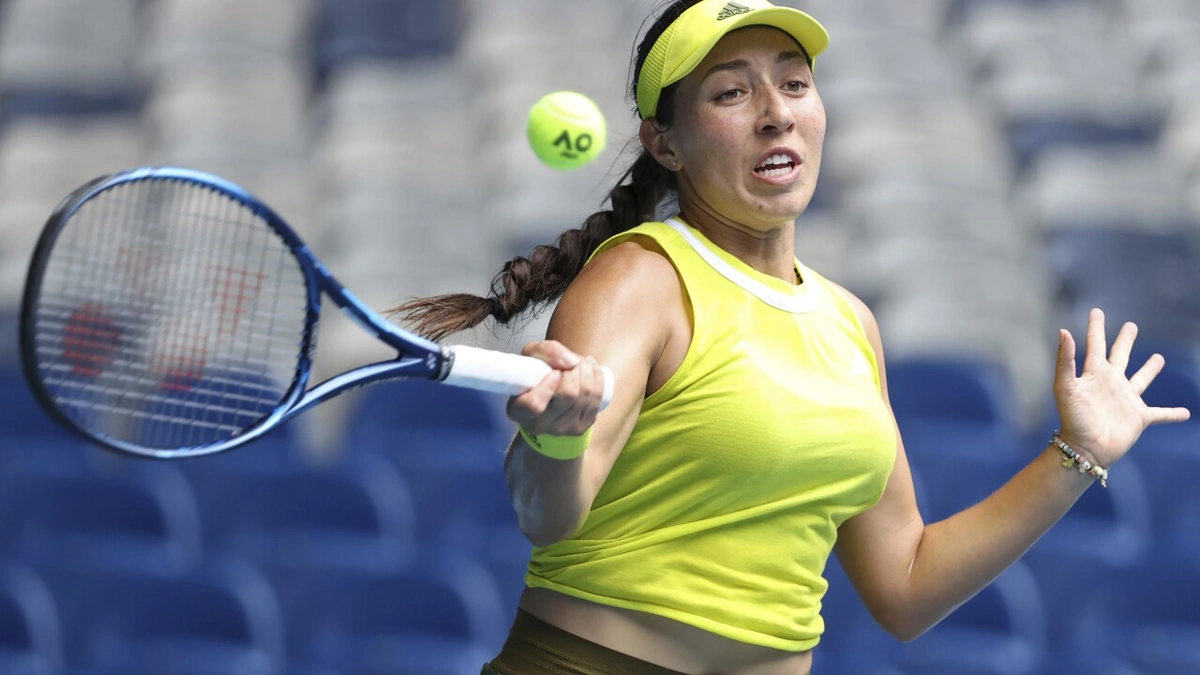Let’s get the obvious out of the way first. When you Google Jessica Pegula , the first thing you’ll likely see isn’t about her killer backhand or her consistent top-10 ranking. It’s that she’s the daughter of Terry and Kim Pegula, the billionaire owners of the Buffalo Bills (an NFL team) and the Buffalo Sabres (an NHL team). This makes her, by a staggering margin, the “world’s richest tennis player.”
And that’s where most stories stop. It becomes a quirky piece of trivia.
But here’s the thing… that’s not the story. That’s just the footnote. The real story, the one that’s far more fascinating, is the one that unfolds on the sweltering hard courts of Melbourne, the clay of Paris, and the manicured grass of Wimbledon. The real story is why someone who never has to earn another rupee in her life chooses one of the most physically and mentally punishing jobs on the planet.
This isn’t just about tennis. This is a story about human drive. And honestly, it’s one of the most compelling narratives in all of sports right now.
More Than Just a Label

Before we dive into the psychology, let’s be crystal clear: Jessica Pegula is an elite athlete. Full stop. The “billionaire” tag is lazy journalism that overshadows a seriously impressive career built on grit, not gold.
She’s a fixture in the WTA Top 10. Her game isn’t built on overpowering flash like some of her peers. Instead, it’s a masterclass in clean, flat hitting and relentless consistency. She takes the ball early, robs her opponents of time, and constructs points with the intelligence of a chess grandmaster. She is, in tennis terms, a grinder. A workhorse. Her success isn’t an accident; it’s earned through thousands of hours of sweat and repetition.
Remember, this is a player who was ranked outside the Top 750 just a few years ago after a devastating hip surgery that could have easily ended her career. Someone who didn’t need to come back, who could have opted for a life of comfort, chose the grueling path of rehab and the lonely grind of the lower-tier tennis circuit to fight her way back. That, right there, tells you more about her character than any Forbes list ever could.
The Psychology of a Grinder Who Doesn’t Need the Grind

So, we come back to the central question. Why? What pushes a person who has access to everything to pursue a life defined by sacrifice, public scrutiny, and the constant threat of injury?
I initially thought it was a simple desire to step out of her parents’ shadow. And sure, that’s probably part of it. But the more you watch her, the more you realize it’s something much deeper. It’s about intrinsic motivation the pursuit of an activity for its inherent satisfaction rather than for some separable consequence.
Let’s be honest. For 99% of professional athletes, money is a massive motivator. It’s the prize money, the endorsements, the financial security for their family. It’s the tangible reward for all the sacrifice. For Jessica Pegula , a $100,000 prize check is, relatively speaking, pocket change. It doesn’t change her life one bit. Winning a match has a different currency for her. The value isn’t monetary; it’s in the validation.
What fascinates me is the unique pressure this creates. While other players face the pressure of needing to win to pay their coaches or support their families, Pegula faces a different beast: the pressure to prove her place is merited. Every win is a statement that she belongs because of her talent, not her name. Every loss risks feeding the narrative that she’s just a rich kid with a hobby. That’s a heavy psychological burden, and her ability to consistently perform at the highest level under that weight is remarkable.
How Her Game Reflects Her Journey

This is where it gets really interesting. Her on-court style is a perfect mirror of her off-court reality. There is nothing entitled about her game. She doesn’t play “trust-fund tennis.”
She is methodical, disciplined, and relentless. She wears opponents down. She doesn’t hit the flashiest winner, but she’ll hit one more ball back into the court than you will. She forces errors through relentless pressure and smart positioning. It’s a blue-collar game played by a billionaire’s daughter. A total paradox.
This style of play requires immense mental fortitude and physical conditioning. It’s not a shortcut to victory; it’s the long, hard road. Her decision to embrace this style, rather than a high-risk, high-reward game, speaks volumes. It shows a commitment to the process, a love for the struggle. It’s the game of someone who knows you can’t buy respect on a tennis court. You have to earn it, point by agonizing point. The pegula family name might get you a good seat, but it won’t win you a single point against the world’s best.
What Pegula’s Story Teaches Us About Passion
Ultimately, Jessica Pegula’s story transcends women’s tennis . It’s a powerful lesson for anyone, whether you’re in Bangalore, Mumbai, or Delhi, trying to figure out what you want to do with your life. It forces us to ask: What would you do if money were no object?
What is that one thing you would pour your heart and soul into, simply for the love of doing it? For the challenge? For the feeling of getting better at something day by day?
Her journey is a testament to the power of purpose. In a world often obsessed with financial outcomes and external validation, she is a living example of finding meaning in the craft itself. Her story is a refreshing reminder that the richest life isn’t necessarily the one with the most money, but the one with the most passion. It’s not about the destination of having it all, but the journey of earning your place, even when you don’t have to. The aresenal of skills she displays is as varied as what you’d see in a high-stakes match betweenSporting KC vs Seattle Soundersin football.
So the next time you see her play, don’t just see the heiress. See the fighter. Because her story isn’t about the wealth she was born into. It’s about the respect she earns, every single time she steps on that court. And frankly, that’s priceless. The same level of dedication is seen in many global sports, fromAustralia vs South Africacricket matches to the local tennis courts.
Frequently Asked Questions About Jessica Pegula
Is Jessica Pegula really a billionaire?
No, Jessica Pegula herself is not a billionaire. Her father, Terry Pegula , is a self-made billionaire with a net worth estimated byForbesto be over $6.8 billion. She is an heiress to this fortune, which is why she is often referred to as the “world’s richest tennis player.” Her own career earnings are in the millions, a testament to her success.
Who are her parents and what do they own?
Her parents are Terry and Kim Pegula. They own Pegula Sports and Entertainment, which includes two major professional sports franchises in the United States: the Buffalo Bills of the National Football League (NFL) and the Buffalo Sabres of the National Hockey League (NHL). Terry Pegula made his fortune in natural gas and real estate.
What is Jessica Pegula’s ranking?
Jessica Pegula has been a consistent presence in the WTA Top 10 in both singles and doubles for the past several years. Her jessica pegula ranking fluctuates, but she has established herself as one of the elite players in the world.
What are her biggest career achievements?
She has won multiple WTA titles, including a WTA 1000 title in Guadalajara in 2022. She has also reached the quarterfinals of all four Grand Slams (Australian Open, French Open, Wimbledon, and US Open) in singles and has been a Grand Slam finalist in doubles.
Has she ever spoken about her family’s wealth affecting her career?
Yes, she has addressed it. Pegula has acknowledged her privileged background but emphasizes that it doesn’t help her on the court. She has stated, “I think it’s a nice story people can latch on to… but it’s not something I think about. I’m here to play tennis.” She has made it clear she wants to be known for her own accomplishments.

